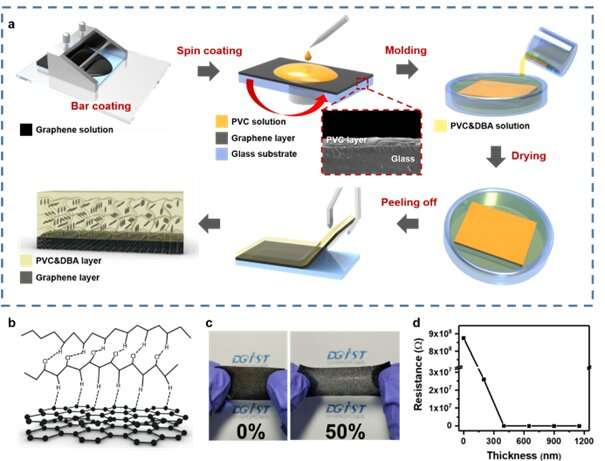Credit: DGIST (Daegu Gyeongbuk Institute of Science and Technology)
Professor Juhyuk Lee of the Department of Energy Engineering has developed an elastic triboelectric generator that can be used in the daily lives of frequent movers. The cause of the output reduction of the elastic triboelectric sensor was identified during joint research with Professor Joohun Lee of Hanyang University's (ERICA campus) Department of Bio-Nanotechnology. Additionally, the professor used graphene to develop a touch sensor with stable output and expand the application of the triboelectric generator. The study is published in the journal Nano Energy.
Along with the rapid growth of various biosensors and wearable devices due to the continuous development of semiconductors and small electronic components, there has been a growing interest in triboelectric generators for use as sensors or energy sources. To use the triboelectric generator in a wearable device, the material that comes into contact with the body must be safe, and the output must be constant despite any deformations caused by movement.
However, the output of conventional elastic triboelectric generators is affected by its change in form. The reason for this relationship was not clearly understood. Similar to previously existing products, there are limitations to precise detection if the output changes along with the change in form, such as stretching.
Therefore, the research team developed a triboelectric generator using graphene electrodes and PVC gel to fabricate a stable sensor with constant output despite physical movement. In particular, the correlation between the transformation rate of the elastic graphene-based electrode and electrical resistance was analyzed to allow constant electricity output from touch and pressure even under the maximum stretching of 50%, which is higher than the transformation rate that can occur from physical movement. In addition, the material used in the research passed the biostability assessment, indicating that it can be used in daily lives.
Professor Juhyuk Lee of the DGIST Department of Energy Engineering said, "The drawbacks of the conventional elastic electrode-based triboelectric generator were addressed, and a technology that generates constant output according to touch or movement was developed. In the future, various applications in the precision sensor sector are expected."
More information: Mingyu Kim et al, Stretching-insensitive stretchable and biocompatible triboelectric nanogenerators using plasticized PVC gel and graphene electrode for body-integrated touch sensor, Nano Energy (2022). DOI: 10.1016/j.nanoen.2022.108159
Journal information: Nano Energy
Provided by DGIST (Daegu Gyeongbuk Institute of Science and Technology)























